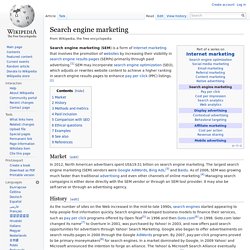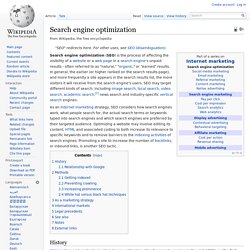

Search engine marketing. Search engine marketing (SEM) is a form of Internet marketing that involves the promotion of websites by increasing their visibility in search engine results pages (SERPs) through optimization and advertising.[1] SEM may use search engine optimization (SEO), which adjusts or rewrites website content to achieve a higher ranking in search engine results pages, or use pay per click (PPC) listings.[2] Market[edit] In 2012, North American advertisers spent US$19.51 billion on search engine marketing.

The largest search engine marketing (SEM) vendors were Google AdWords, Bing Ads,[3] and Baidu. As of 2006, SEM was growing much faster than traditional advertising and even other channels of online marketing.[4] Managing search campaigns is either done directly with the SEM vendor or through an SEM tool provider. It may also be self-serve or through an advertising agency. Search engine advertising. Content search engine optimization. As an Internet marketing strategy, SEO considers how search engines work, what people search for, the actual search terms or keywords typed into search engines and which search engines are preferred by their targeted audience.

Optimizing a website may involve editing its content, HTML and associated coding to both increase its relevance to specific keywords and to remove barriers to the indexing activities of search engines. Promoting a site to increase the number of backlinks, or inbound links, is another SEO tactic. The plural of the abbreviation SEO can also refer to "search engine optimizers", those who provide SEO services. History Early versions of search algorithms relied on webmaster-provided information such as the keyword meta tag, or index files in engines like ALIWEB. Discussion board participation. E-lead generation.